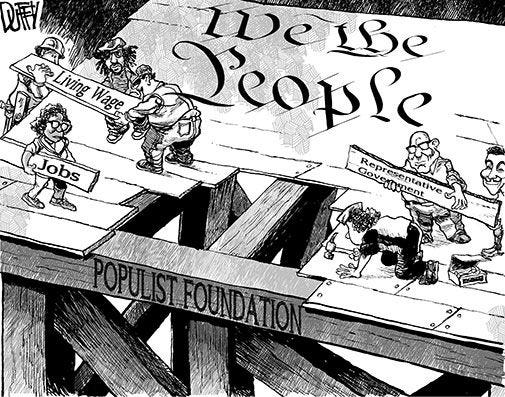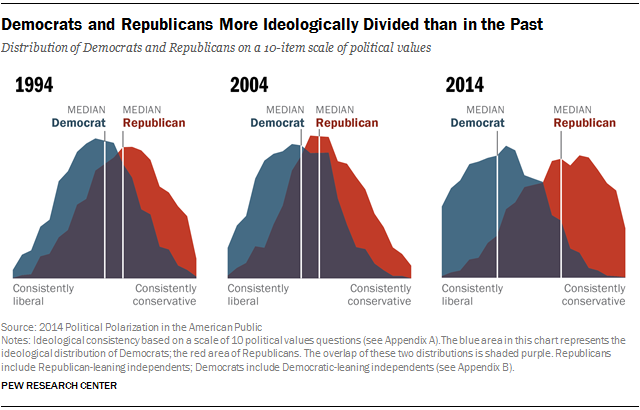🔋Debt Pt. 4: Populism
Wealth inequality has led to the disenchantment of today's working class, which is leading to populism seen around the world and with cases riddled throughout history.
If you found this article interesting, click the like button for me! I would greatly appreciate it :)
Life is a game of exchanges. Whether it be money, time, or resources, everything we do for ourselves and others is a trade of some kind. For example when you work you are trading time for money, when you buy things you are trading money for resources, and when you spend time with family you trade time for happiness/meaning. One of the fundamental economic principles is the idea of opportunity cost. What are you missing out on by doing what you are doing. The textbooks teach something like if you can produce 8 oranges and 2 apples in 1 day and each are worth a dollar, you are better off making oranges and trading for apples even if you like apples more. A real life example would be if you spend $100 today, that’s $100 less compound interest in the stock market worth $1000 in the future for retirement. Another would be if you choose to go/not go to college, or if you choose to be a plumber you can’t be a dentist, etc.
Recently a new song from an unknown artist went viral. Rich Men North Of Richmond is a tale of the woes of the working class in America today. It is worth listening to the short viral song if you haven’t already. Considering the boom in the song over the first week of its release, it is clear it has hit a nerve in millions of people. Whether you agree or resonate with the message or not, it shows the rising angst and dissatisfaction with the ruling elite in the country and blames them for the poor living standards for the working class. The song touches upon the rising wealth inequality and poor wages. It also talks about how the ruling class is “above the law” in certain instances, often in harmful ways. Consider these two charts to relate the song to the data. First, we have recently experienced 25months of negative wage growth on top of a landscape of poor wage growth for low and middle wage earners since the 80s.
On top of that, the compensation has not been keeping up with productivity, perhaps contributing to the sense that the wealth is not available for the working class.
Growing up in the rust belt region, an area known for its manufacturing and industry jobs which have been gutted over the past 20 years leaving people without quality jobs and wages, I can really see this connection in people. Through this process of losing jobs to foreign companies who can outcompete with lower wages, recent price inflation, and tax burdens, many people in the country have become disenchanted and feel like there is no way to keep up. While there are many great things to look forward to in the US like technology, freedom, and opportunities for almost anything, there is a growing list of people whose skills have been neglected, feel taken advantage of by those enjoying the riches, and work like crazy just to stay behind.
The law of opportunity cost can sometimes fail people, leading to lower confidence and increased uncertainty. Trading time for money is a losing battle given their personal situations. It seems like there are no options left for people, and that’s frankly the point in history where major changes or turmoil often take place. Fundamentally, this is how people make more extreme decisions over time and polarization arises. When your safe options are limited, you get pushed out on the risk curve and make more extreme decisions financially and politically.
While financially we have seen a dramatic increase in risky options trading and speculative crypto/nft/stock trading, this is born out politically through the deterioration in political candidates and emergence of populist leaders. Merriam-Webster defines populism as
1. a member of a political party claiming to represent the common people.
2. a believer in the rights, wisdom, or virtues of the common people
While this sounds good, leaders like Trump in the US or Le Pen in France today arise out of dissatisfaction with the status quo, not necessarily the virtue of their political ideas. These politicians can take advantage of dissatisfaction of the working class, the victimhood from the state or other groups, or distrust of “outsiders”. History is riddled with populist leaders claiming to be saviors there to right the wrongs only to cause more problems than they fix. They often prove authoritarian in nature, implement collectivist economic policies, and do little to solve the root cause of the issues. Classically, they are born out of a polarized political environment with a stressed working class.
You can see many on the left in outrage over the song I mention above, I think with a hypersensitivity to any potentially right wing threats leading to the malaise towards the video. You can see similar sensitivity on the right with socialist/social equity ideologies or other left wing threats for example. While the left vs. right debate is a fools errand symptomatic of other issues in my opinion, there is no question that the polarization has intensified greatly and even more-so since the data below came out.
The wealth divide is one of those other issues in my opinion which exacerbates polarization among people who misplace frustration. When the top 0.1% of people share the same wealth as the bottom 90%, it is correlated with the emergence of populism. This feeling that the system is unfair and some are holding the riches tends to result in more extreme politics.
This relates to the debt problems as financial repression through inflation is a stealth tax on the lower classes. We have been living in financial repression for the last 20 years in the US. From Debt Pt. 3,
The most poignant example of financial repression is post-WW1 Weimar Germany. To anyone unfamiliar, the book When Money Dies is a fascinating and detailed account of the financial repression that occurred in Germany between WW1 and WW11. In short, due to high foreign debt obligations in large part due to mandatory war reparations, Germany hyperinflated its currency to pay down debt and stimulate the economy. This destroyed the wealth many had accumulated in stocks, savings, and real estate, made most wages unlivable, and pushed the country toward a barter economy. The value of a mark went from 5 marks/dollar to over 1 trillion marks/dollar by the end.
This devastation and poor financial conditions in post WW1 in Germany was used as leverage in the rise of the German National Socialist Workers' Party and its subsequent transformation into an authoritarian state by Hitler. Similar trends are seen in the Russian Revolution, where philosopher/economist Karl Marx influenced political leaders to use his ideas to captivate the desperate working class in search of hope, ultimately leading to revolution and the authoritarian Lenin/Stalin regime. Latin America is riddled with examples of these leaders gaining power, sometimes aggravated by the US. I’ve mentioned two such cases of Peru and Chile in the past.
Early in the US’s history, Andrew Jackson was known as the “peoples president” and rid the US of its second national bank (central bank = todays federal reserve) in direct opposition to the supreme court of the time. He is quoted,
It is to be regretted that the rich and powerful too often bend the acts of government to their selfish purposes
Unfortunatly, his analysis of the role of the central bank rings true today, as it is been a tool to boost asset prices held primarily by the already well-off and bailout the large banks without consequence from 2008 on. Jackson’s policy would swing in the reverse with William Jennings Bryan and the populist party of the early 1900s. While he ran for president and lost all three times, he served as secretary of state under Woodrow Wilson. They were responsible for implementation of a progressive income tax and more importantly the federal reserve (third US central bank). The inception of the federal reserve and its subsequent power boost upon de-pegging from the gold standard under Nixon in 1971 has allowed the exorbitant debts in the US to accumulate without recourse. This in my opinion, is the main driving force for the wealth inequality and plight of the working class. It is only ironic that populism started the federal reserve and ultimately led to the reemergence of the political trend we are seeing today.
Inflation from the state incentivizes short term thinking and spending money because your money will be worth less in the future if you hold it. Through this mechanism of inflation, intentional or not by the government, causes people to lower their time horizons and think more in the short term. This short term thinking drifts into other areas of life and contributes to politics being more about immediate effects than long term benefits for society and the country. Ultimately, populism is where it goes when people get to the point of desperation.
Populism can be problematic because it is often coincident with major changes throughout history. While it is certainly possible that a leader like Andrew Jackson who works to unselfishly decentralize the control of the ruling elite to the favor of the working class, it is more likely that a populist leader extracts further control and centralization of power shown in many instances throughout history. Until next time,
-Grayson
Leave a like and let me know what you think!
If you haven’t already, follow me at twitter @graysonhoteling and check out my latest post on notes.
Let someone know about Better Batteries and spread the word!
Socials
Twitter - @graysonhoteling
LinkedIn - Grayson Hoteling
Email - betterbatteries.substack@gmail.com
Archive - https://betterbatteries.substack.com/archive
Subscribe to Better Batteries
Please like and comment to let me know what you think. Join me by signing up below.






